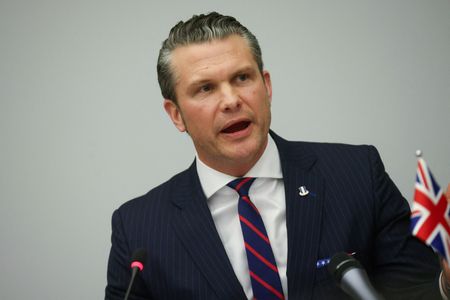By Francois Murphy
VIENNA (Reuters) -Talks to form Austria’s first coalition government led by the far-right Freedom Party (FPO) collapsed on Wednesday after negotiations with the conservative People’s Party (OVP) had already ground to a halt, with each side blaming the other.
The eurosceptic, Russia-friendly FPO had been seeking to lead a government for the first time since it was founded in the 1950s under a leader who had been a prominent Nazi.
The FPO came first in September’s parliamentary election with around 29% but was only tasked with forming a government last month once a centrist attempt to do so without it failed. The OVP was its only potential coalition partner.
“Just now, FPO leader … Herbert Kickl informed President Alexander Van der Bellen that the coalition talks with the OVP have failed,” the FPO said in a statement moments after Kickl met Van der Bellen in the president’s office.
The ball is now in Van der Bellen’s court. Most likely either a centrist attempt to form a government will be revived or the Alpine republic will head towards a snap election with polls suggesting the FPO’s lead over other parties would grow.
The FPO had initially planned to reach a deal quickly since it overlaps with the OVP on many issues, particularly taking a hard line on immigration. But the mood soured as it became clear the FPO was making many demands that were always going to be difficult or unacceptable for the OVP.
“Before the remaining points of contention could be clarified at chief negotiator level, the OVP insisted on clarifying the distribution of portfolios at the beginning of February,” Kickl said in a letter to Van der Bellen saying he was handing back his mandate to form a government.
“Although we made concessions to the OVP on many points in the subsequent talks, the negotiations were ultimately unsuccessful, much to our regret,” Kickl said.
The FPO’s insistence on control of both the finance and interior ministries was a major obstacle in the talks, as was a laundry list of demands such as exceptions to sanctions against Russia or challenging the primacy of European Union court rulings.
Both sides issued statements suggesting a division of ministries on Wednesday morning. The OVP also said the FPO had not addressed its demand that fundamental matters be guaranteed, such as the rule of law, the absence of Russian influence, and Austria being a “reliable partner to the European Union”.
The FPO replied that those principles included points the parties’ leaders needed to discuss but “the OVP refused to have this discussion because it wanted to have the issue of ministries conclusively resolved first”.
Such finger-pointing is exceptional since the parties had agreed not to unilaterally make details of their talks public. It suggested they were no longer able to hold such discussions behind closed doors, or that they may be more concerned with public perception as their talks falter.
(Reporting by Francois Murphy; editing by Mark Heinrich)











